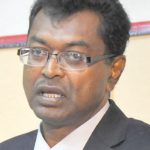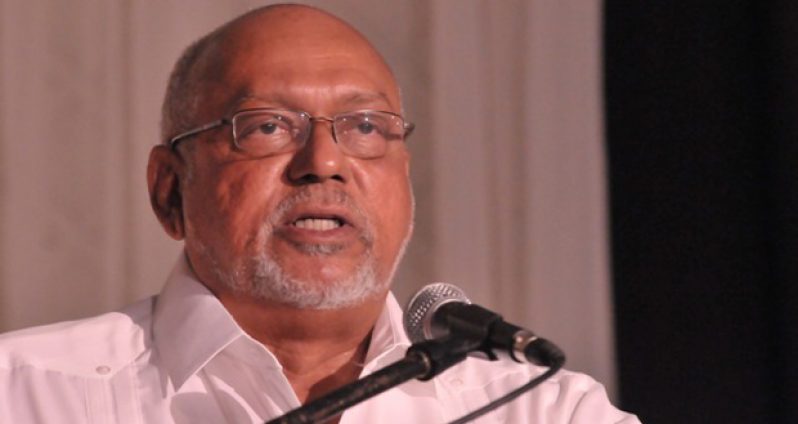IN every instance of talks with the Opposition, the Government has come to the table with its positions and has reduced those to minimum positions, making concessions; whereas the combined Opposition parliamentary parties have held on to their maximum positions.
T

hese were the sentiments expressed by President Donald Ramotar, at his most recent press briefing last week Friday when he addressed the challenges of engaging A Partnership for National Unity (APNU) and the Alliance for Change (AFC) in talks.
The Head of State’s most recent invitation for talks, since the prorogation of Parliament has been ignored by the combined Opposition.
In proroguing Parliament, Mr. Ramotar was emphatic that this was intended to pave the way for greater dialogue among political parties, while keeping the 10th Parliament alive to address the critically important issues currently before the National Assembly.

When asked to respond to the charge from APNU Leader, Brigadier (rtd.) David Granger, that the Government has not granted any concessions during talks with the two Opposition parties, the President made it clear that this was untrue–a fact supported by clear evidence.
He said: “It is the other way around….it was not me, but the Opposition that has taken these (maximum) positions…the agreements that we have reached, there haven’t been that many, but it’s been we (the current Administration) who have been making the concessions.
“…these things are public knowledge; these things are known….I have not been hard or holding so strongly to my grounds.”
As it relates to the latter, the Head of State highlighted that the only instances he has held his ground is on areas he felt strongly about, and even here, there were concessions; for example as it relates to the passage of the Anti-Money Laundering and the Countering of the Financing of Terrorism (AML/CFT) (Amendment) Bill.
REJECTED OWN BILL
Ahead of the Financial Action Task Force (FATF) June plenary in Paris, France, APNU had proposed three amendments, which were included in the Party’s draft amendments to the Principal AML/CFT Act.
President Ramotar indicated that APNU’s demands would be supported, if APNU agreed to making future amendments, was the Bill, which included APNUs’ amendments, found to be in breach of international AML/CFT standards. This was rejected.
APNU’s position was an ‘all-or-nothing’ one, as the Party then stressed that it wanted its three amendments to be included in the AML/CFT Bill, as well as other demands.
These included that the President give his assent to several Bills passed in the National Assembly, including the Local Authorities (Elections) (Amendment) Bill 2013, which states that elections must be held on or before August 1, 2014. The Head of State has already forwarded his explanation for his-non assent to the National Assembly.
Since June, Guyana, at FATF’s October plenary, has managed to avert being placed on an international blacklist and the high level commitment of the Government, coupled with demonstrable actions taken by the country, has been credited for this feat.
Guyana was referred to FATF last November by the Caribbean Financial Action Task Force (CFATF), after missing a compliance deadline, as a result of which the country was blacklisted regionally.
The move was a result of Guyana’s cited failures relative to the passage of the Anti-Money Laundering and Countering the Financing of Terrorism (AML/CFT) (Amendment) Bill, which continues to languish before the Parliamentary Special Select Committee reviewing the Bill.
President Ramotar noted that the combined Opposition has been unreasonable in demanding its “maximum” positions, as opposed to negotiating a position of consensus.
UNREASONABLE DEMANDS
Another example of this, he pointed out, is the AFC’s demand for the establishment of the Public Procurement Commission (PPC), which the government has agreed to, providing that Cabinet retain its no-objection role in the process; but the latter position has been rejected by the AFC.
The Procurement (Amendment) Bill 2013 was read a first time in the National Assembly last November and aims to amend the 2003 principal Procurement Act by making changes to section 54, deleting subsection six – effectively restoring Cabinet’s no-objection role.
Section 54 deals with Cabinet’s involvement in reviewing the award of procurement contracts and the phasing out of its functions with the establishment of a Public Procurement Commission, in the interest of de-centralising the procurement process.
Subsection six states that: “Cabinet’s involvement shall cease upon the establishment of the Public Procurement Commission, except in relation to those matters referred to in subsection one which are pending.”
Without the Procurement (Amendment) Bill 2013, once the PPC is established, Cabinet’s no-objection role will no longer be effective.
While there have been moves at the level of the Public Accounts Committee to address the establishment of the PPC, the PPC cannot be set up without a two-thirds majority support in the National Assembly.
The Government’s consistent argument has been that if a Government is charged with accounting for the nation’s finances, it should have, at least, a no-objection to the award of contracts.
“I have not been unreasonable,” the President stressed, adding that these are only two examples of the failed engagements with the combined Opposition.
OLIVE BRANCH
Additionally, at the opening of the 10th Parliament, in 2012, the Head of State had extended an olive branch to the combined Opposition.
He acknowledged that moving forward would require maturity and political cooperation in the interest of the development of Guyana, despite differences among the parliamentarians.
“I am convinced that we have the capacity to rise to this challenge. I am satisfied that we are capable of demonstrating to the Guyanese nation that, while political competition and diversity are essential in a democracy, they should not foreclose on the possibilities for compromise and consensus in the way we do business. Indeed, the make-up of this new Parliament dictates that we seek consensus and compromise, and should resist the temptation to believe that any party can ride roughshod over another. Any such attempt may see us missing the historical opportunities that this new composition offers,” Mr. Ramotar had said in 2012.
The President had, in stressing the importance of members of the National Assembly working together in the best interest of all citizens, also committed his Government’s efforts to working with the combined Opposition.
Last Friday, when asked about his thoughts on his ‘olive branch’, he acknowledged that his invitation did not bring the results he expected.
Mr. Ramotar said, “It did not bring all the results that I wanted. I thought that we could have developed a much better working relationship and I thought that if we based our actions on the interest of the people, there would have been many areas where we could have found agreement on….but personal political agendas seemed more important to some people, than national development.”
Given the current political state of affairs, the Government’s attempts at dialogue and the Opposition’s refusal of the most recent invitation to talks, Guyana could, very likely, be headed to an early general election. The last election was held in November, 2011.




.png)









